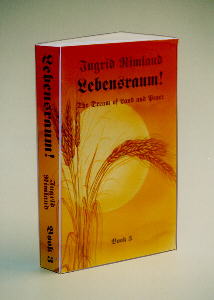

A review by Helmut Becker
Book III of "Lebensraum" continues the monumental German-American trilogy by Ingrid Rimland to its tragic conclusion, from the aftermath of the Bolshevik Revolution to the devastation of Germany at the end of World War Two. At the outset, the reader is thrown straight back to the terror and suppression on the farm collective that was Apanlee. Revolutionary slogans abound everywhere: Liberation, fairness and justice for all.
The truth looked different. Rimland tells a horrifying story of the Checka's net (the Secret Police) tightening its grip, of family after family being brutalized, shot or haunted away from their homes. Their "crimes"? For example, keeping a bible hidden in the attic, or stashing away a potato or handful of wheat kernels to feed a starving child, all capital crimes. The driving force behind the purge against the Germans in the Ukraine is again the evil character of Dominick. He becomes an expert in applying terror, causing incredible pain and suffering among the hapless and helpless Germans. Torture abounds, as ethnic cleansing is practiced long before becoming a modern concept in Yugoslavia or Rwanda during the past three or four years.
In stark contrast to the suffering of the Germans in the Ukraine, life in Germany is good under the mesmerizing leadership of the F¸hrer. Rimland portraits every-day life in glorious terms as seen through the eyes of Jonathan and Heidi. Jonathan had escaped the Bolshevik massacre in Apanlee and made his way to Berlin. Heidi, who runs a youth hostel in Berlin, takes him in as a sort of substitute mother and restores him to a sense of normalcy and happiness. Rimland masterfully captures the unbelievable spirit of renewal and idealism afoot throughout the land, as reflected in speeches, progress reports, and the general well-being of the people. Heidi's radiance and enthusiasm for the cause comes before the eyes of the reader in communicating with Jonathan. He, in turn, is caught up in the euphoria, as he goes off to war during "Barbarossa", the code name fort Russian campaign.
Indeed, Jonathan enters Apanlee as part of a panzer division, which is welcomed with open arms. Under the protection of the German Landser, life in Apanlee returns to some sort of normalcy. The Bolsheviks are driven out, and the hated Dominick disappears. Rimland describes the progress of the war only from a distance with occasional transports of troops coming through Apanlee and wounded soldiers returning from the front; and she uncannily recreates the deceptive, unnatural calm that temporarily settles over Apanlee.
The turning point comes with the attack on Pearl Harbor by Japan. Declared as "a day of infamy" by President Roosevelt, America is now unified to enter the war, exactly what the president wanted. "Gun the Hun" becomes the warcry in Mennotown as elsewhere, and America allies herself with the Antichrist, the Russian Beast. With the help of the Americans, the tide of the Russlandfeldzug soon turns, the German Army is forced to retreat and the long and painful trek westward begins.
The warfront coming closer and closer to Apanlee, Marleen, Natascha and Mimi realize, they must leave. Rimland's description of the terror, pain and suffering in the latter part of Book III is so vivid, so real, so horrid, it can only come from someone who survived the ordeal. The dreadful trek of refugees continues West, but barely, between bombings and partisan attacks. Rumors that the Western Allies would join the F¸hrer against the Red Army creates flickers of hope, only to be dashed by the realities of winterstorms, snipers, gnawing hunger and death.
It all comes to naught with the collapse of the Third Reich in the ruins of Berlin. In a true act of fratricide, Archibald Epp, the fiery preacher from Mennotown, kills Jonathan Neufeld from Apanlee, who had become a SS-soldier in the German Army.
Much of the concluding Epilogue of Book III is told by Erika. Now a successful writer of film scripts in Hollywood, she had barely survived the ordeals of terror bombings, rapes and total chaos in the dying city of Berlin. Now on a visit to Mennotown, Rimland relates the deep, internal and sometimes external struggle experienced by these ethnic Germans in their search for truth, identity. They are seeking the truth, truth about their history and motives. That truth often clashes with the accepted version of World War II that is rarely, if ever, questioned.
Rimland dares to tell the story of millionfold German civilian sufferings and deaths, these not being taught in history classes. Though the characters are fictional, Rimland's underlying story of the German minority in the Ukraine and elsewhere in the Soviet Empire, their expulsion and destruction by the millions, is based on historical truths. Though decried as Revisionist hatemongering by much of the mainstream press and, sadly, most likely prohibited in "democratic" Germany by its notorious hate-crime laws, "Lebensraum" is a "MUST" reading for anyone interested in learning what it was like to be on the other side.